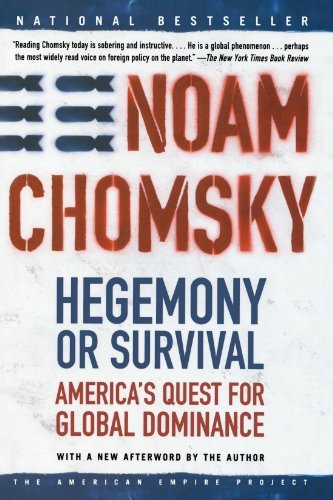
Failed States: The Abuse of Power and the Assault on Democracy
Book Description
Power corrupts, and nowhere is this more evident than in the shadows of a democracy under siege. Noam Chomsky unveils the harrowing truths behind failed states, exposing the relentless abuse of authority and the fragile fabric of freedom. As political deceit spirals into chaos, the very essence of what democracy can and should be hangs in the balance. With piercing insights and startling revelations, Chomsky challenges readers to confront unsettling realities that shape our world. What happens when those who hold power violate the very principles meant to uphold society? The clock is ticking, and the stakes couldn’t be higher.
Quick Book Summary
In "Failed States: The Abuse of Power and the Assault on Democracy," Noam Chomsky delivers a scathing critique of U.S. domestic and foreign policy, arguing that the United States increasingly exemplifies characteristics of a failed state. Chomsky defines a failed state as one that is unable or unwilling to protect its citizens, adhere to the rule of law, and respect democratic institutions and norms. Through detailed analysis, he demonstrates how the U.S. undermines international law, perpetuates global instability, and subverts democracy both abroad and at home. Chomsky challenges the idea of American exceptionalism and exposes the dangers of unchecked governmental power, urging readers to recognize the urgent need for accountability, civic engagement, and meaningful democratic reform to prevent further erosion of foundational freedoms and safeguards.
Summary of Key Ideas
Table of Contents
Characteristics of Failed States
Chomsky begins by defining the concept of a failed state—not merely as a collapsed or chaotic government, but as one that fails its own people by refusing to safeguard basic rights, protect citizens, and respect legal frameworks. He notes the growing resemblance between the United States and nations typically labeled as failed states, pointing to systemic issues such as entrenched corruption, growing inequality, and the manipulation of law to serve elite interests. This critical lens reframes the U.S. not as a global beacon, but as a polity at risk of undermining its own founding principles.
Erosion of Democracy and Civil Liberties
Central to Chomsky’s analysis is the erosion of democracy and civil liberties at home. He discusses how political power brokers exploit fear, stifle dissent, and marginalize public participation. The Patriot Act, widespread surveillance, and the undermining of judicial independence are cited as evidence of an assault on democratic norms. Chomsky argues that genuine democratic engagement is often discouraged, and meaningful power remains concentrated among a narrow elite, which manipulates policy for personal gain and perpetuates social and economic disparities.
U.S. Foreign Policy and International Law
Turning to foreign affairs, Chomsky examines how U.S. policy repeatedly violates international law under the guise of national security or the promotion of freedom. He highlights interventions, unilateral actions, and selective support for democracy abroad as tactics that often result in destabilization, violence, and resentment. These actions, he contends, not only betray universal values but also breed cycles of conflict and undermine America’s credibility, exacerbating global perceptions of hypocrisy and double standards.
Propaganda, Media, and Public Perception
A critical theme in the book is the role of media and propaganda in shaping public perception. Chomsky discusses how concentrated media ownership and official narratives limit the scope of public debate, filter information, and manufacture consent. By marginalizing dissenting voices and promoting government-sanctioned viewpoints, the media serves as a tool for sustaining the status quo. This manipulation prevents the public from making informed decisions and shields policymakers from accountability for abuses of power.
Paths to Democratic Renewal
Chomsky concludes by suggesting that there is an urgent need for democratic renewal and civic engagement. He calls for a reassertion of popular sovereignty through grassroots movements, policy reforms, and the reclamation of public institutions from private interests. Only by confronting the realities of power, practicing transparency, and upholding the rule of law, he argues, can societies resist the slide into failed-state status and revive the promise of authentic democracy.
Download This Summary
Get a free PDF of this summary instantly — no email required.





